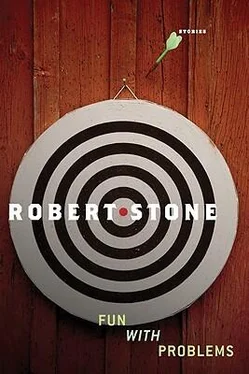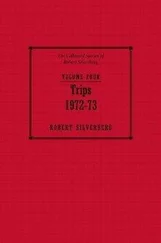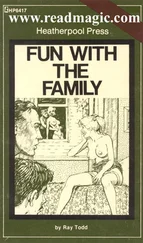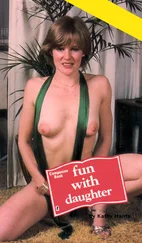Around Westminster, I began to feel the dive. Its sensation was accompanied by a sudden suspicion that Lucy's reversal of fortune might be a little too good to be true. When I got home I took two pain pills and believed her again.
Not long after this we read that Asa Maclure was dead. He had AIDS all right, but it wasn't the disease that killed him. The proximate cause of his death was an accident occasioned by his unsteady attempt to cook some base. He set himself on fire, ran as fast as he could manage out of his San Vicente apartment and took off down the unpeopled sidewalks of the boulevard. He ran toward the ocean. Hundreds of cars passed him as he ran burning. According to one alleged witness, even a fire truck went by, but that may have been someone's stroke of cruel wit.
Asa Maclure was a wonderful man. He was, as they say, a damn good actor. He was also enormous fun. In the end, he was a good friend too, although obviously a difficult one. Suffice it to say I mourned him.
Jennifer and I went to his funeral. It was held at a freshly painted but rickety-looking black church in what had once been a small southern town not thirty miles from where her parents lived in Oak Lawn. Asa's father presided, his master in declamation. Asa had resembled his father, and the man was strong and prevailed over his grief. There were a few people from the industry, mostly African American, all male. Praise God, Lucy did not appear.
Back in Dallas at my in-laws' stately home, we had a few bourbons.
"Your friend has the kiss of death," Jennifer said. She delivered this observation without inflection, but it remained to hover on the magnolia-scented air of that cool, exquisitely tasteful room.
Both of my optioned scripts were being green-lighted.
From what I read in the papers it seemed Lucy had been replaced in the mad genius's picture. The neighborhood production of Vanya opened with no mention of her. I presumed she had read for it. Maybe she had assumed the part was hers. Once I met her for a sandwich in a Beverly Hills deli and we talked about Ace's death. Lucy spoke slowly, with great precision, and was obviously high. I was worried about her and also concerned to discover where Ace's death had left her.
"I've compartmentalized my life," she declared. She had brought with her a huge paperback book with dog-eared pages and she showed it to me. It was a collection of drawings by Giovanni Piranesi that featured his series called Imaginary Prisons, in which tiers of prison cells are ranked along Gothic stone staircases and upon the battlements of vast dungeons that ascend and descend over spaces that appear infinite. For reasons that many art lovers will immediately comprehend on seeing some of his drawings, Piranesi is a great favorite among cultivated junkies. His prisons are like their world.
On the blank pages in the book Lucy had written what she called plans. These were listed in columns, each laid out in variously colored inks and displaying Lucy's runic but attractive handwriting. When she handed the book to me for comment I could only utter a few appreciative sounds. Every word in every paragraph of every column was unreadable. I still have no idea what she had written there. Finally I could not, for my life, keep myself from saying something meant to be friendly and comforting about Asa. I got the same cold suffering look I had seen when Brion Pritchard died.
In the weeks after that, in a craven fashion, I kept my distance from her because I was afraid of what I might see and hear. She didn't call. Also the trip to Texas had left Jen and me closer somehow — at least for a while.
A few months later Lucy left a message on our machine, absurdly pretending to be someone else. Suddenly I thought I wanted to see her again. The desire, the impulse, came over me all at once in the middle of a working afternoon. On reexamination, I think the urge was partly romantic, partly Pavlovian. I was concerned. I wanted to help her. I wanted to get seriously high with her because Jen didn't use. So my trip back to Silver Lake was speeded by a blend of high-mindedness and base self-indulgence. It's a fallen world, is it not? We carry love in earthen vessels.
Lucy's house was not as dirty and disorderly as it had been on my previous visit, but everything still looked rather dingy. She did not garden or wash windows; she no longer employed her help. And she no longer cooked, since crack, the industrialized version of base, had obviated that necessity. It was safer too and far less messy than basing. The rocks went straight from the baggie into the stem. For me the hit was even better. She had Percocet and Xanax for coming down, a lot of them. She was still very attractive, and I later learned she had a thing going with a druggy doc in Beverly Hills who must have been something of an adventurer.
"I'm going to Jerusalem!" she said. She said it so joyously that for a second I thought she had got herself saved by some goof.
"Yes?" I approved wholeheartedly. Seconds after the pipe, I approved of nearly everything that way. "How great!"
"Listen to this!" she said. "I'm going there to live in the Armenian quarter. In a monastery. Or, like, a convent."
"Terrific! As a nun?"
She laughed, and I did too. We laughed loud and long. When we were finished laughing she slapped me on the shoulder.
"No, ridiculous one! As research. Because I'm going to do a script about the massacres. I'm going to sneak into Anatolia and see the Euphrates."
She had an uncle who was a high-ranking priest at the see of the Jerusalem patriarch. He would arrange for her stay, and she could interview survivors of the slaughter.
"I want to do this for my parents. For my background. I won't say 'heritage' because that's so pretentious."
"I think it's a great idea."
I was about, in my boisterous good humor, to call her project a pipe dream. Fortunately I thought better of it.
She saw the thing as eminently possible. The Russians had unraveled and she might film in Armenia. There were prominent Armenian Americans in the movie business, in town and in the former USSR. She had me about a quarter convinced, though I wondered about the writing. She had the answer to that.
"This is yours, Tommy! Will you do it? Will you go with me? Will you think about it? Please? Because if you wrote it I'm sure I could direct. Because you know how it is. You and me."
Naturally the urgency was intense. "It's a sweet idea," I said.
"You could bring your wife, you know. I forget her name."
I told her. She had somehow deduced that Jennifer was younger than she.
"They're all named Jennifer," she said.
As if to bind me to the plan, she pressed huge handfuls of Percocet on me. Starting to drive home, I realized that I was too rattled to make it all the way to Encinitas. I checked into a motel that was an island of downscale on the Westwood — Santa Monica border and called Jen, home from her classes. I explained how I had come up to inquire into something or other and suddenly felt too ill to make it back that evening.
"Don't drive then," Jen said. I could see trouble shimmering on the blacktop ahead.
Next Lucy disappeared. Her phone was suddenly out of service. The next time I was up in town I went to her house and found it unoccupied. The front garden was ochre rubble and the house itself enclosed in scaffolding. It was lunchtime, and a work crew of Mesoamericans in faded flannel shirts were eating In-N-Out burgers on the roof.
Once I got a message in which she claimed to be in New York. It was rambling and unsound. She said some indiscreetly affectionate things but neglected to leave a number or address. I did my best to tape over the message, to stay out of trouble. I had only partial success.
A little serendipity followed. I heard from a friend in New York, a documentary filmmaker, whom I hadn't seen in many years. He had gone into a boutique on Madison and met the gorgeous salesperson. She seemed glamorous and mysterious and dressed enticingly from the store, so he asked her out. He thought she might go for a Stoppard play, so he took her to the play and to the Russian Tea Room and then to Nell's. People recognized her. It turned out she was an actor, a smart actor, and could talk Stoppard with insight. She was a wild but inspired dancer and had nearly nailed a part in a Broadway play. She knew me, was in fact a friend of mine.
Читать дальше












